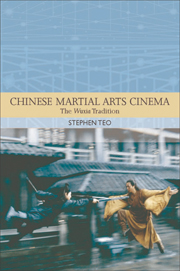Book contents
- Frontmatter
- Contents
- TRADITIONS IN WORLD CINEMA
- Acknowledgements
- Dedication
- Introduction
- 1 Wuxia from Literature to Cinema
- 2 Reactions against the Wuxia Genre
- 3 The Rise of Kung Fu, from Wong Fei-hung to Bruce Lee
- 4 The Rise of New School Wuxia
- 5 The Wuxia Films of King Hu
- 6 Wuxia after A Touch of Zen
- 7 Wuxia between Nationalism and Transnationalism
- Epilogue
- Glossary
- Bibliography
- Filmography
- Index
4 - The Rise of New School Wuxia
Published online by Cambridge University Press: 05 August 2013
- Frontmatter
- Contents
- TRADITIONS IN WORLD CINEMA
- Acknowledgements
- Dedication
- Introduction
- 1 Wuxia from Literature to Cinema
- 2 Reactions against the Wuxia Genre
- 3 The Rise of Kung Fu, from Wong Fei-hung to Bruce Lee
- 4 The Rise of New School Wuxia
- 5 The Wuxia Films of King Hu
- 6 Wuxia after A Touch of Zen
- 7 Wuxia between Nationalism and Transnationalism
- Epilogue
- Glossary
- Bibliography
- Filmography
- Index
Summary
As the Wong Fei-hung series reached the end of the 1950s, it inevitably wore itself out through repeated variations of a theme, and although it would continue to run on throughout the 1960s, audiences were beginning to tire of the series and they returned once again to the wuxia film seeing it as a refreshing and exciting if also familiar genre. The freshness of wuxia in this period emanated from the ‘new school’ (xinpai) fiction that had seized the popular imagination by way of the newspapers and its practice of serialisations of martial arts novels. This literary phenomenon began in the mid-1950s, and introduced new writers of wuxia fiction such as Jin Yong and Liang Yusheng to the public for the first time. The new school rejuvenated the genre and the popularity of their stories increased the circulations of the newspapers that serialised them.
Liang Yusheng, born in 1922, started writing in 1954 for the New Evening Post (Xin wan bao). Liang wrote his first ‘serial’ Longhu dou jinghua (The Lion and Tiger Vie in the Capital), apparently at the behest of his editors who wanted to take advantage of the great public interest in martial arts following a contest fought in Macau on 17 January 1954 between a master of the White Crane school and a Taiji master. This event received intensive coverage from the press, and is generally considered by historians to have been the catalyst of the ‘new school’ wuxia literature.
- Type
- Chapter
- Information
- Chinese Martial Arts CinemaThe Wuxia Tradition, pp. 86 - 114Publisher: Edinburgh University PressPrint publication year: 2009



